
Blog: Integrating Palliative Care in Fragile Settings: a Transformative Paradigm
![]() Hannah Ikong
Hannah Ikong
![]() 10th March 2023
10th March 2023
We're pleased to share a webinar on "Palliative care in low resource and fragile settings" from Dr Mhoira Leng, given on 23rd February 2023 and hosted by the International Christian Medical and Dental Association (ICMDA).
The talk was introduced as this: "Compassionate care for the whole person is at the heart of palliative care. Walking alongside people and their families facing chronic illness and into the end of their lives is an immense privilege. In many parts of the world this care is not available representing one of the greatest health inequalities. In other situations, economic, cultural and political pressures can undermine values orientated, faith based holistic care. In Jesus we have the ultimate example of compassionate holistic care... how do we reflect his example in how we approach suffering and how we care for those those in pain?"
I would encourage you to watch the video recording to explore the answers to this question from the talk and the discussion that followed. Below I have included some of my own highlights of the webinar, all quotes from Dr Mhoira Leng.
Excerpts from the webinar:
When I want to talk about transformation today, I want to come to the heart of palliative care, holistic care for people living with chronic illnesses which includes the quality of life of that living, but also the quality of life of the end. The end, the dying time, is a very precious and important time, but not the whole of palliative care, and on to supporting families and bereavement.
I want to think about this transformational model in lives, in practises, in systems, and in societies. What is at the core? Values based holistic care, promoting dignity … the relief of suffering, demonstration of compassion, not just the empathy, but the demonstration of compassion. And alongside that, for me, particularly when I think of the inequalities of our world (and I am going to say something about those) fighting for justice.
[In reference to the integrating palliative care house diagram, with people at the centre.] The patients and their families are at the heart of this. There's a number of very helpful indicators that you can look at if you are setting up services or want to know more. I would encourage you to do that [follow indicators], but doesn't make sense for this gentleman, an amazing man I met in the refugee camps in the north of Uganda, and where we've been doing some work. He was telling me how they built a 1,000-seater mud hut church. His request for me was, “Can you find us some Bibles in the Bari language?” So the needs may not be the ones that we expect, but we need to be able to listen, and it needs to make sense for a gentleman like this.
Just one last thought in terms of looking at this global picture. This is the floods in Pakistan, and we're looking at the earthquakes in Turkey and Syria. We're hearing of storms even now of Madagascar and Mozambique. Planetary change, climate change, is disproportionately going to affect those who are not already fragile, and that as that must be part of our thinking and part of our Christian response.
There is a term called fragile settings. If you're not aware of it again, you can have a look at the detail of this, but it's a way to understand, not just the places where this active conflict or in natural disaster, but the countries, next door those where there is political instability, or weak health systems, or a high burden of disease, or protracted emergencies. And I think you look at this map, and you're not surprised to see many countries in Africa, but also in the Middle East and Afghanistan … So what is palliative care mean in those settings?
There's a word which my Gaza students use when we're talking about spiritual distress. It's an Arabic word which says, our world has been shaken. And I think for me that represents the distress that is the heart of suffering, and much of that distress will be spiritual. Of course we talk about the financial, the social, the physical, the emotional, but at the heart of much of the distress is that lack of meaning and open purpose. What do we say to people whose world has been shaken? Or how do we respond to people?
One of the values of quality [palliative care] is compassion. And this is not a lovely acknowledgement of the role that we have in bringing compression into these settings. Let me just give you some specifics. … In Malawi, Jane Bates has a wonderful paper which talks about how making better choices, giving people information, helping and giving support them at home, may, in fact, reduce poverty. This is really important in our fragile settings, so that people are making the right decisions for them.
I’ll just finish by asking you what gives you hope? How do you restore your hope when you're engaging in suffering? Some of the things we talk about when we talk about hope, and breaking bad news, and tender conversations; meaning and connection and comfort and love and hope and presence and strength. And ultimately we find that in that deep relationship with the loving God who has forgiven us, who has saved us, and has given us ability to have a relationship with us and the privilege of working in his purposes and plans.
This is one hope that I love and I think of often when I'm walking that journey with people. God shall wipe away all tears from their eyes, and they shall be no more death, neither sorrow nor crying, neither there shall be any more pain, for the former things passed away.
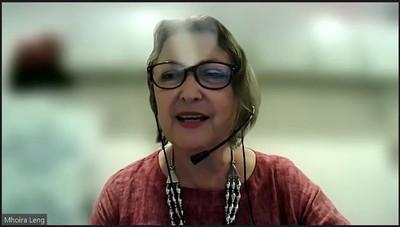
Snap of Dr Mhoira Leng during the webinar. Fun fact: she recorded this talk while in India!
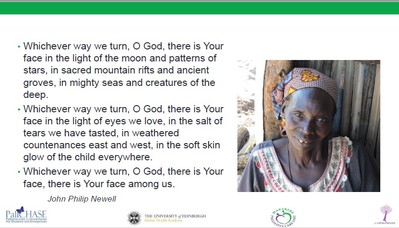
Opening prayer and reflection to the presentation, ending with: "Whichever way we turn, O God, there is Your face, there is Your face among us."
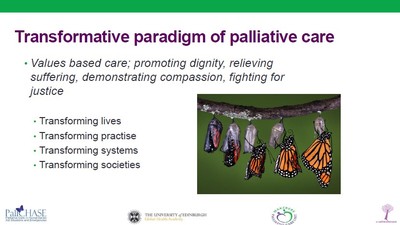
Using the photo of a chrysalis turning into a butterfly, we see transformational change from palliative care in lives, practice, systems, and societies.
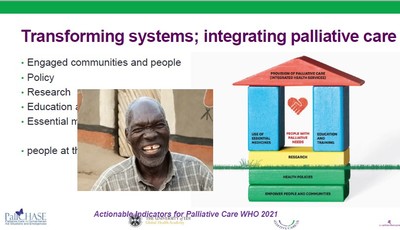
Actionable Indicators for Palliative Care (WHO 21) build a home of support around the patient and family. Pictured is a gentleman whose surprising request for Bibles reminds us to ask and then listen.
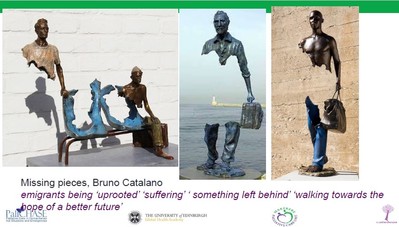
There are many graphs and charts that describe fragile settings where palliative care is needed the most. These sculptures by Bruno Catalano speak even deeper than the numbers of refugees.
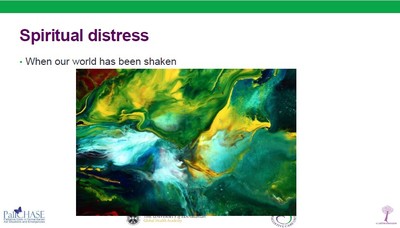
There's an Arabic term that means "when our world has been shaken." Spiritual distress often feels like this.
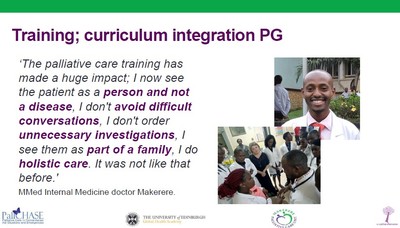
Watch the video recording for more examples of transformative palliative care education and capacity building.
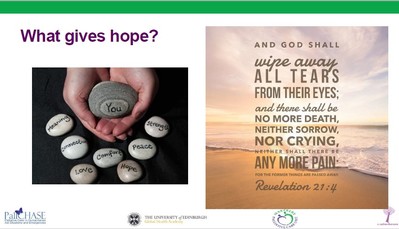
Finally, finding true hope and strength to better #BuildingAWorldThatCares.
